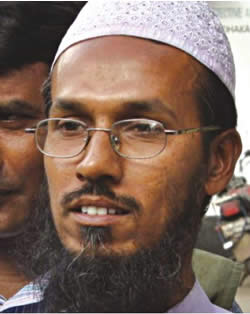 [Bangla Daily Star] Detained Mufti Obaidullah, one of the most wanted Laskar-e-Taiyeba leaders in India, used six mobile phones and had regular contact with Ameer Reza, chief of Asif Reza Commando Force (ARCF) working with the Pakistan-based Islamist militant outfit, said Detective Branch (DB) of police sources.
[Bangla Daily Star] Detained Mufti Obaidullah, one of the most wanted Laskar-e-Taiyeba leaders in India, used six mobile phones and had regular contact with Ameer Reza, chief of Asif Reza Commando Force (ARCF) working with the Pakistan-based Islamist militant outfit, said Detective Branch (DB) of police sources.Obaidullah on Friday told The Daily Star at the DB headquarters that he knew Ameer Reza quite well. He had close relations with Ameer's brother Asif Reza, the founder of ARCF, who was killed in an encounter with law enforcers in Gujarat in 2001, said Obaidullah, who is fluent in Bengali, Hindi, Urdu and Persian languages. DB officials said Obaidullah sent SMS to Ameer Reza and others in Pakistan in Persian language using English alphabets.
Meanwhile, Obaidullah, a madrasa teacher at Shibchar in Madaripur, was placed on a seven-day remand after DB police produced him before the Dhaka Metropolitan Magistrate's Court with a 10-day remand prayer. Deputy Commissioner Monirul Islam of DB (South) told The Daily Star, "The call lists of the mobile phones used by Obaidullah show that he made calls to Pakistan regularly and often to India. He talked to Ameer Reza every day over the phone. But we are yet to find out the subjects of their conversation."
DB sources said there is a strong possibility that Laskar-e-Taiyeba, ARCF, Harkatul Jihad al Islami Bangladesh (Huji), and international mafia don Dawood Ibrahim's network are interconnected.
Picked right up on that, didn't they?
Obaidullah's immediate boss and Laskar-e-Taiyeba leader Mansur Ali alias Habibullah, another senior leader and Pakistani national Khurram Khoiyam, and two other leaders of the militant outfit are still holed up in Bangladesh, said sources. They entered Bangladesh illegally at least three years before Obaidullah intruded into the country, added sources.
DB officials said they have been trying to track down the four most wanted Laskar-e-Taiyeba leaders in India. However, they suspect that Mansur Ali and Habibullah are two different persons. All of them receive financial supports from India, DB sources said.
In this case that should likely read "entities within India"...
Monirul said, "He got Tk 7,000 as monthly salary from the madrasa. It is quite impossible to meet the expenditure of a seven-member family and six mobile phones."
Quoting Obaidullah, DB officials said his organisation has a firm footing at Shibchar in Madaripur, Srinagar in Munshiganj and Nababganj in the capital with a good number of 'Jihadis' (militants) at the madrasas there.
Laskar-e-Taiyeba has been active in Bangladesh for the last 14 years, said intelligence sources quoting Obaidullah. He was organising Bangladeshi 'mujahids' to wage 'jihad' following the directives from Ameer Reza, said the sources.
| Obaidullah took part in Afghan conflicts four times. Besides, he carried out militant activities in India with the help of Islamist militants from Pakistan and Afghanistan. |
DB identified Obaidullah on the basis of confessions of detained Indian national Dawood Merchant, a close aide to Dawood Ibrahim and one of the main accused in music baron Gulshan Kumar murder case. Dawood Merchant and his associate Zahid Sheikh, also an Indian national, were arrested in Bangladesh about one and a half months ago.
Obaidullah had been teaching at Jamiatul Sunnah Madrasa of Shibchar upazila in Madaripur since 2003. Earlier, he taught at different madrasas in Jessore, Moulvibazar and also at Nawabganj in Dhaka using fake name Abu Zafar.
Our Madaripur correspondent adds: The authorities of Jamiatul Sunnah Madrasa yesterday terminated Obaidullah from his post and expelled his son Matiur who was studying at the institution. Hussain Ahmed, principal of the madrasa, said the decision was taken after authorities became sure about the identity of Obaidullah and his son.
Obaidullah's wife Nasima Begum said her husband made frequent trips abroad in the name of attending religious function.
Officer-in-Charge (OC) of Shibchar Police Station Abdul Jalil said intelligence vigilance has been strengthened to monitor the activities of all madrasas in the area.

 [Bangla Daily Star] Pakistan based Islamist terrorist organisation Laskar-e-Taiba has been active in Bangladesh for the last 14 years, intelligence sources said quoting one of the most wanted Indian terrorists recently captured here. Local leaders of the organisation have links to the network of absconding Indian mafia don Dawood Ibrahim, and also to leaders of other Islamist militant organisations like Harkatul Jihad al Islami Bangladesh (HuJi), the sources added.
[Bangla Daily Star] Pakistan based Islamist terrorist organisation Laskar-e-Taiba has been active in Bangladesh for the last 14 years, intelligence sources said quoting one of the most wanted Indian terrorists recently captured here. Local leaders of the organisation have links to the network of absconding Indian mafia don Dawood Ibrahim, and also to leaders of other Islamist militant organisations like Harkatul Jihad al Islami Bangladesh (HuJi), the sources added.